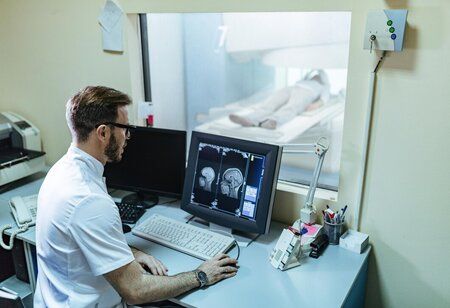By Consultants Review Team
 The most powerful MRI scanner in the world has now released its first photographs of a human brain, a major advancement in accuracy that should shed light on the mysterious depths of human intellect and the diseases that affect it. Leading this achievement is a team of scientists from France's Atomic Energy Commission (CEA), who used the scanner for the first time to examine a pumpkin in 2021. On the other hand, recent approval from health authorities has made it easier to use for human testing.
The most powerful MRI scanner in the world has now released its first photographs of a human brain, a major advancement in accuracy that should shed light on the mysterious depths of human intellect and the diseases that affect it. Leading this achievement is a team of scientists from France's Atomic Energy Commission (CEA), who used the scanner for the first time to examine a pumpkin in 2021. On the other hand, recent approval from health authorities has made it easier to use for human testing.
About twenty fit volunteers have entered the realm of the magnetic resonance imaging (MRI) machine during the previous several months. It is located in the Plateau de Saclay area, south of Paris, which is home to many IT companies and universities.
“We have seen a level of precision never reached before at CEA,” said Alexandre Vignaud, a physicist working on the project.
A cutting-edge scanner dubbed Iseult has unveiled an unprecedented magnetic field strength of 11.7 teslas. This formidable force empowers the device to capture images with a staggering tenfold increase in precision compared to the standard MRIs deployed in medical facilities, typically operating within a range of three teslas.
The researcher behind this progress, Dr. Vignaud, demonstrated how this cutting edge technology may change lives. He demonstrated the significant increases in visual clarity by comparing Iseult pictures with those from traditional MRIs. "Thanks to this amazing device, we can now see minute details like the blood vessels feeding the brain cortex or reveal subtleties in the cerebellum that were invisible before," Dr. Vignaud said, highlighting the scanner's unparalleled capacity for diagnosis.
The French minister for research and a physicist, Sylvie Retailleau, was astounded at the level of accuracy attained, saying, "It's almost unbelievable!" She stressed in a statement that this ground-breaking accomplishment represents a major breakthrough in the identification and management of brain disorders.
Encased in a five-meter (16-foot)-long and five-meter-high cylinder, the apparatus is powered by a 1,500-ampere coil that generates a gigantic 132-ton magnet. The machine has an entrance that is 90 centimeters (three feet) wide and easily accessible by humans.
The design is the result of twenty years of joint research efforts by German and French engineers. While South Korea and the United States are working together to produce MRI equipment with similar power, human imaging trials have not yet begun.
One of the main goals of using such powerful scanning powers is to improve understanding of the structure of the brain and the particular areas that fire when doing different kinds of cognitive activities.
Different cerebral cortex areas have been identified by previous MRI research as activating when the brain analyzes particular inputs, such faces, places, or phrases.
The project's scientific director, Nicolas Boulant, claims that using Iseult's 11.7 tesla strength would enable a more thorough investigation of the relationship between brain anatomy and cognitive abilities like reading and mental math.
Scientists hope that the scanner's power will also shed light on the mysterious processes behind psychiatric illnesses like schizophrenia and depression as well as neurodegenerative diseases like Parkinson's and Alzheimer's.
The goal of understanding how the hippocampus and other regions of the cerebral cortex operate in Alzheimer's disease is highlighted by CEA researcher Anne-Isabelle Etienvre.
Additionally, researchers want to map exactly where in the brain certain drugs like lithium, which are used to treat illnesses like bipolar disorder, are distributed.
The increased magnetic field produced by the MRI may provide more precise information about the brain areas that lithium targets, which might lead to more individualized treatment plans depending on each patient's reaction.
Etienvre highlights the potential for earlier detection and more successful therapies as a result of our growing understanding of these crippling illnesses. Regular patients won't be able to use Iseult's amazing ability to peek into their minds for the foreseeable future.
Although the machine is not intended to be a clinical diagnostic tool, Boulant made it clear that hospital settings are expected to benefit from the insights it generates during operation. A new group of well volunteers will be recruited in the coming months to undergo brain scans. Before the device is used for individuals with medical issues, a few years will pass.
We use cookies to ensure you get the best experience on our website. Read more...